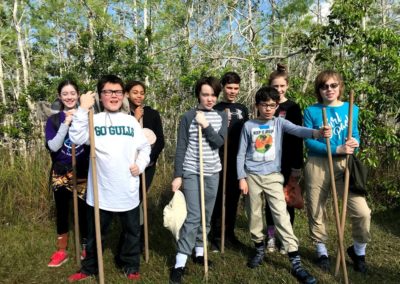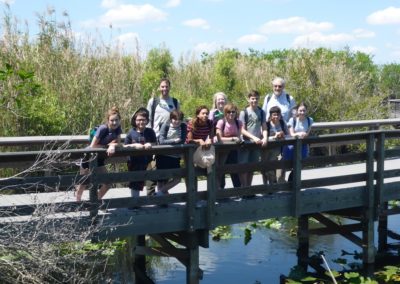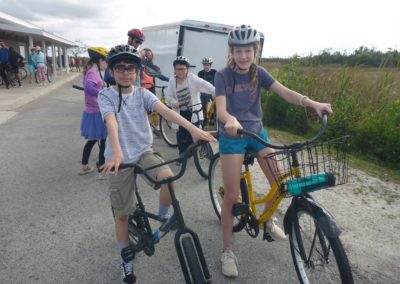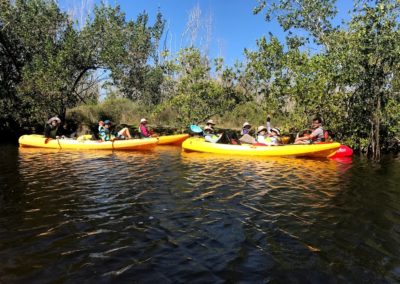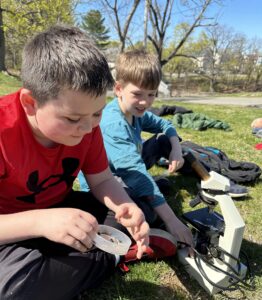
How We Learn
At Phoenix, learning is an active journey—full of doing, being, exploring, experimenting, questioning, researching, designing, engineering, and leading. Our students work alongside their peers and with younger and older partners, discovering new ways to grow every day.
Nearly forty years ago, Phoenix transformed education by putting students at the center, giving them a voice and an active role in shaping their own learning. Today, we’re still leading the way as an innovative, experience-driven learning community. Phoenix provides the ideas, tools, and meaningful experiences that empower each student to be their best. With teachers as partners in our K-8 journey, we focus on the process over the product, building skills through rich, project-based learning.
In mixed-age groups, students take on meaningful projects with peers of different ages, interests, and skills, forming friendships and honing collaboration skills. Phoenix values creativity, perseverance, citizenship, innovation, and empathy—qualities that prepare our students to thrive in a world that needs thoughtful, capable, and compassionate leaders. Here, learning is always an adventure—one that grows with our students and follows them wherever they go.
Nestled in the heart of vibrant Salem, MA, Phoenix stretches learning far beyond the classroom walls. While many private schools define their campus by property lines, our campus spans all 18 square miles of Salem and reaches into nearby cities, making the world our classroom.
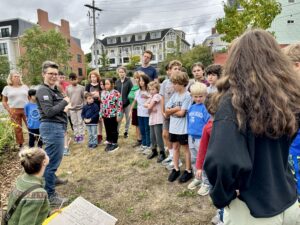
Salem’s unique mix of city and coastline offers a wealth of community resources and learning opportunities, from historic sites to natural preserves. At Phoenix, we embrace these resources enthusiastically. Whether
traveling by car, bus, or train, our students learn in diverse and inspiring locations that add depth and real-world relevance to their education.
This approach sparks a lifelong love of learning and builds a spirit of curiosity, exploration, and connection to both local and global communities. Education at Phoenix is a journey that continues well beyond school grounds. Our teachers, students, and local experts come together to make learning a dynamic and shared experience.
Challenge-Based Learning – Learning through Action
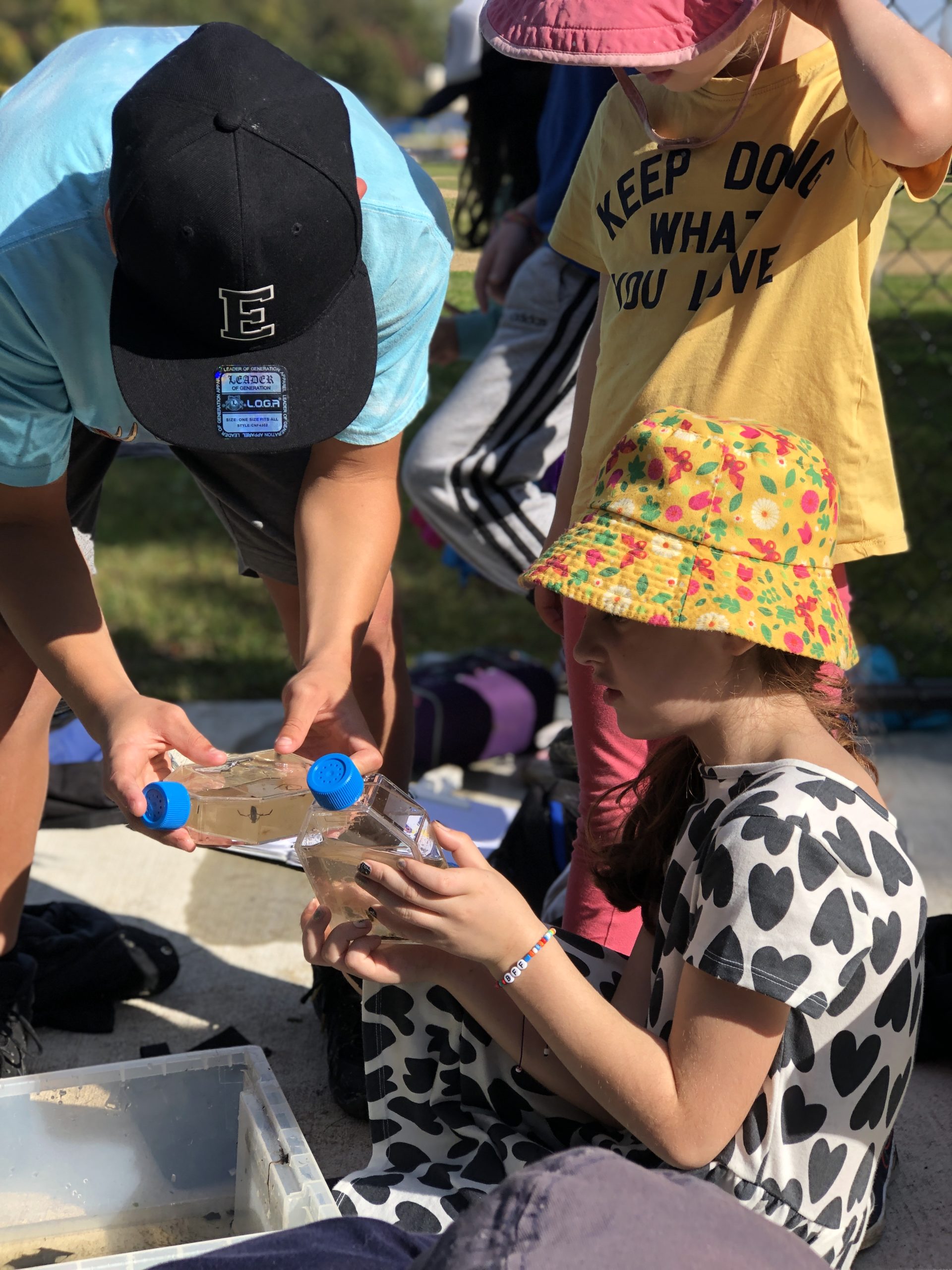
At Phoenix, learning isn’t just something that happens at a desk; it’s an active, immersive journey that challenges students to think deeply and act with purpose. Our hands-on, minds-on, feedback-based learning model lets students develop their skills through real-world applications, fostering adaptability, resilience, and a lifelong curiosity.
In our multi-age classrooms, students work within diverse, mixed-grade teams that change frequently, blending perspectives and strengthening essential life skills. Weekly projects in subjects like Language, Science, Math, Writing, Music, and the Arts bring together students from K-8 grades, creating a dynamic environment where all voices are heard, valued, and respected. Working with students of different ages and personalities promotes leadership, teamwork, and empathy in every student, and it gives each child the chance to contribute meaningfully, no matter their grade level.
Our multi-age, team-based approach is at the heart of Challenge-Based Learning, where students engage collaboratively to solve problems and complete projects that span multiple subjects. This structure encourages communication and cooperation, while fostering an environment where children learn to appreciate the strengths of their teammates. Together, they take on challenges that promote whole-child development, helping them grow academically, socially, and emotionally.
Phoenix’s curriculum goes beyond academics to focus on whole-child learning—an approach that values every aspect of a student’s development. By providing hands-on, minds-on experiences, we teach students how to adapt to new situations, think on their feet, and respond creatively to change. This adaptability is key in our ever-evolving world, and our students learn it by doing.
We also believe in learning beyond the classroom. Whenever we can, we take our students outside, into the heart of Salem and beyond. Here, they thrive, taking on new challenges, exploring their interests, and connecting their learning to the world around them. At Phoenix, the city is our classroom, and the world is our playground for discovery.
Curriculum
Preparing Students for the Challenges of the 21st Century
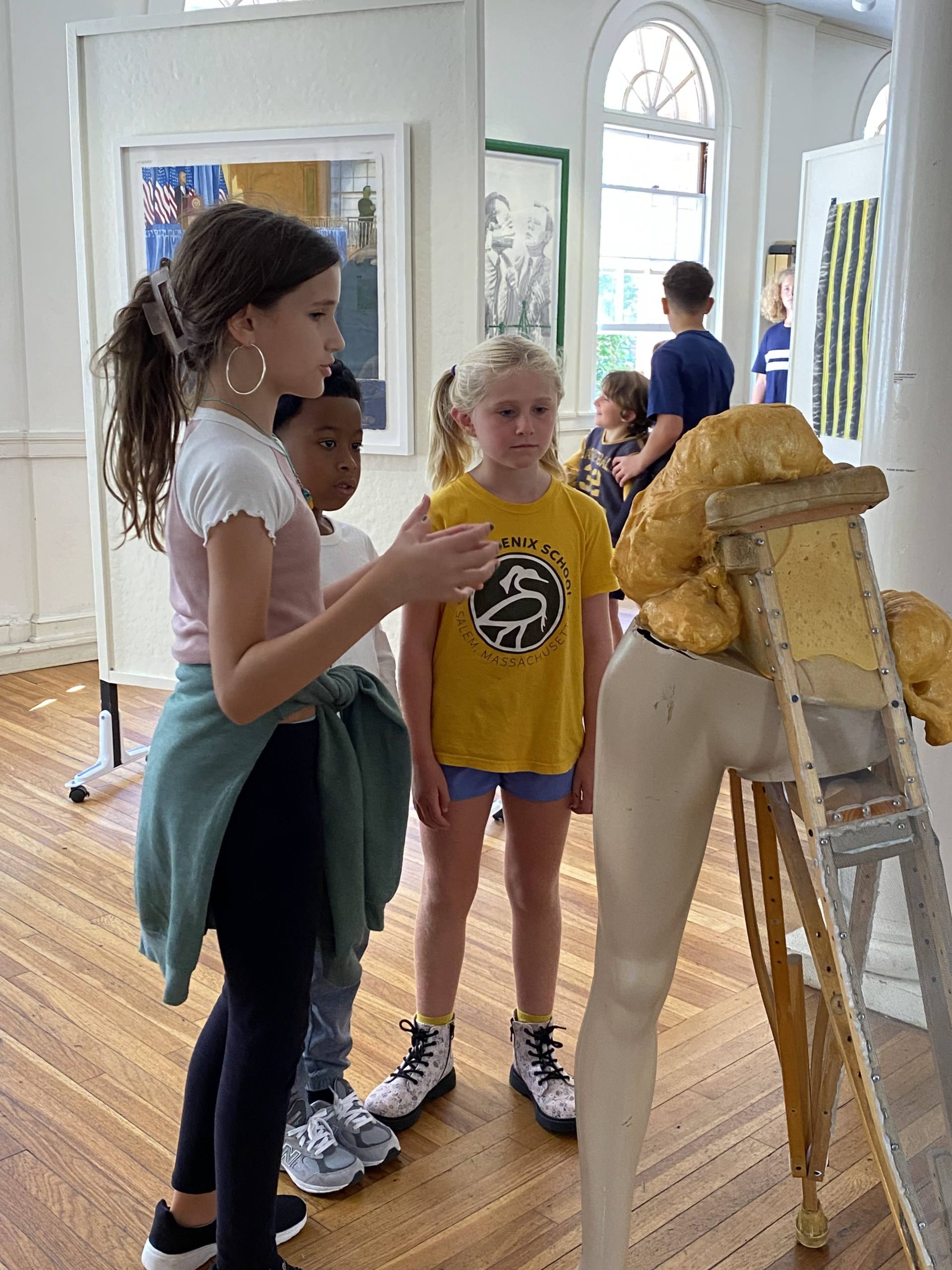
At Phoenix, we believe that learning is a lifelong journey that unfolds everywhere—at school, at home, and out in the world. We cultivate a mindset of curiosity within an environment that encourages exploration and questioning, seamlessly blending academic knowledge with real-life experiences.
We see schools as integral parts of their communities—both local and global. This philosophy drives us to venture beyond our classroom walls, seizing opportunities to connect with our surroundings and welcoming outside experts and community members to share their insights.
Inside the school, students collaborate in diverse partnerships and teams, bringing together different ages, genders, and skill levels. This collaborative approach fosters not only academic growth but also social skills, empathy, and a deeper understanding of the world around them. At Phoenix, every experience is an opportunity for learning, and we’re committed to helping our students thrive in all aspects of their lives.
The Phoenix School:
• A Small School, Big Ideas and Opportunities.
• The World is Our Campus
• The Arts are Everywhere
• A K-8 School Community in One Room
• Leadership and Collaboration Begins in Kindergarten
• Learning Maps Vary
• Younger Kids Benefit From Older Kids’ Advice
• Kids Can Make a Difference
• Reflections Enhance Thinking
A Small School, Big Opportunities
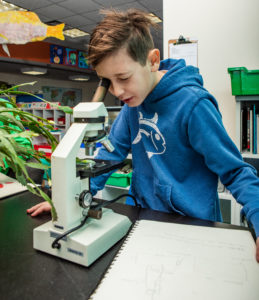 What unique opportunities does a small school like Phoenix offer that larger institutions may not? Here are just a few:
What unique opportunities does a small school like Phoenix offer that larger institutions may not? Here are just a few:
What unique opportunities does a small school like Phoenix offer that larger institutions may not? Here are just a few:
At Phoenix, we embrace flexibility. Unlike many larger schools, where subjects are taught within a rigid schedule, our curriculum weaves subjects together, allowing us to follow the interests of individual students, groups, or the entire school community. This approach enables us to dive deeper into topics without interruptions when the bell rings, fostering a more enriching learning experience.
Being purposefully small allows us to provide individualized education in ways that the average classroom cannot. We can tailor our teaching to meet each student’s unique needs, interests, and learning styles. Our adaptable daily schedule prepares students to handle the unexpected, teaching them to embrace the surprises that come with each day. This flexibility encourages a mindset of resilience and adaptability, essential skills for life beyond school.
In a small school, strong personal relationships flourish. Students and teachers build meaningful connections that support learning, risk-taking, and personal growth. As students progress through the school, they enjoy continuity, maintaining relationships with teachers who know them well. This close-knit environment creates a sense of belonging, where everyone knows one another, celebrating each other’s successes while supporting one another through challenges.
As a vigilant small school community, we identify and address issues—such as bullying or personal conflicts—before they escalate. Here, students are empowered to take an active role in their education, collaborating closely with peers and teachers of different ages and backgrounds.
Parent involvement is another hallmark of our community at Phoenix. Families are encouraged to contribute their time and expertise, enriching the educational experience.
While Phoenix may be smaller than many consider a “small school,” this only amplifies the advantages we offer, creating a nurturing and supportive environment where every student can thrive.
The World is Our Campus
Our home base near the heart of downtown Salem is just that — our home base. Rather than a campus that provides all the facilities needed for the curriculum, we have chosen to integrate the world around us, near and far, into our campus.
The Arts are Everywhere
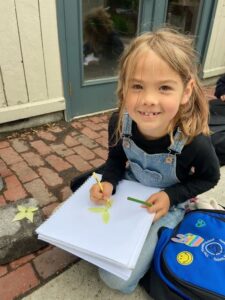 We are often asked, “How do you produce such amazing artists when you don’t have art classes or an art studio?” or “How in the world did you create that performance in four days without a script and with every student having a part?” or “How do you interest kids in classical music?”
We are often asked, “How do you produce such amazing artists when you don’t have art classes or an art studio?” or “How in the world did you create that performance in four days without a script and with every student having a part?” or “How do you interest kids in classical music?”
In a small school, we value the ability to integrate the arts into the total curriculum rather than segregate them in special rooms. We view them as much more than a means of expression, although that is certainly one important aspect of an arts curriculum. They are also a means for assessment (the child who drew a picture of a mill girl in the looms room with an electric light bulb over her head had missed the fact that the mills were powered by water). They are also a means of communication (“a picture is worth a thousand words when taking notes,” we often say). They are an essential vehicle for documenting information, especially for right brain learners who process information better through drawing than words. They give students an opportunity to use higher level thinking skills when they apply knowledge in different creative ways — a PowerPoint presentation, or the creation of an original play teaching about the Renaissance.
A K-8 School Community in One Room
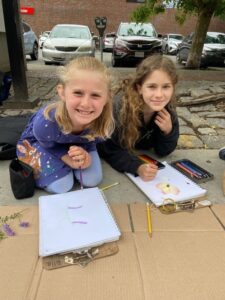 In one large space divided into smaller learning areas full of books, materials, and technology, students of all ages explore, learn, and discover. The arrangement of the room allows them to easily find whatever tools for learning they need and they don’t have to wait to go to the Library or Computer Lab, to the Art or Music Room in order to be able to access the equipment and materials. It also allows them to be more independent in the use of the space, knowing where to find what they need and where to put it back when finished with it. Here students in grades Kindergarten through grade 8 work and learn together — sometimes independently, sometimes in partners or in teams, Sometimes they might be divided by age, sometimes by ability, sometimes working altogether. Each experience has a purpose, but in the end, what results is a strong community of learners who understand one another. This is what allows us all to go away together at the end of the year for our All-School Trip to some place in New England. It’s like going away with your family–which is what we are — a Phoenix family.
In one large space divided into smaller learning areas full of books, materials, and technology, students of all ages explore, learn, and discover. The arrangement of the room allows them to easily find whatever tools for learning they need and they don’t have to wait to go to the Library or Computer Lab, to the Art or Music Room in order to be able to access the equipment and materials. It also allows them to be more independent in the use of the space, knowing where to find what they need and where to put it back when finished with it. Here students in grades Kindergarten through grade 8 work and learn together — sometimes independently, sometimes in partners or in teams, Sometimes they might be divided by age, sometimes by ability, sometimes working altogether. Each experience has a purpose, but in the end, what results is a strong community of learners who understand one another. This is what allows us all to go away together at the end of the year for our All-School Trip to some place in New England. It’s like going away with your family–which is what we are — a Phoenix family.
Leadership and Collaboration Begins in Kindergarten
I’ll show you where the Geo-strips are. I used them yesterday.” “Let’s figure that out together.” These are typical comments that five year olds have been heard to say as they try to find a role for themselves in a busy K-8 schoolroom. Their best day of the year might be when the nursery school kids come for the Halloween Party and they get to be their ‘big partners.’ Otherwise they are open to the small steps that begin leadership and collaboration. When they are in 3rd-5th grades they become ‘packing partners’ responsible for a K-2 partner at the beginning of the day and end of the day. They might be their reading partner each morning for ten minutes or a leader of a K-5 project learning team. By the time students are at the upper end of the school, they are ‘team leaders,’ teachers of the after-school courses, coordinators of all-school teams for creating a piece for Revels or for an all-school problem-solving project. By 8th grade, we expect them to be the leaders of the School — our representatives to the local community, should they choose to accept that responsibility. This is very different approach from one-day-a-week Reading Buddies.
Learning Maps Vary
 At Phoenix, we recognize that everyone is different. This is especially true here, with our diverse population of students. Each comes with his/her own learning map developed by the range of experiences each has had. They are not all in the same place in their learning, even at the same age, so the most effective teaching approach is not to give everyone the same information at the same time, up in front of the group. At Phoenix where teachers are facilitators, we view our job as that of opening many different doors for different students. With our guidance, each must learn what best fits his/her needs at a given point in time, and learn the best approach for accessing it just as the teachers learn what works best with individual students. The daily and frequent dialoguing that goes on between student and teachers as they “check-in” throughout the day is probably the single most important vehicle for learning and teaching that goes on at Phoenix because here students reflect on their work, teachers asks questions to help clarify what was meant, new directions might be given or a mini-lesson to tidy up a specific skill or a new challenge presented. Gone are the days when students receive a grade and that’s that. At Phoenix we follow most pieces of work to its end–one that reflects the abilities of each child, not the same expectation for everyone.
At Phoenix, we recognize that everyone is different. This is especially true here, with our diverse population of students. Each comes with his/her own learning map developed by the range of experiences each has had. They are not all in the same place in their learning, even at the same age, so the most effective teaching approach is not to give everyone the same information at the same time, up in front of the group. At Phoenix where teachers are facilitators, we view our job as that of opening many different doors for different students. With our guidance, each must learn what best fits his/her needs at a given point in time, and learn the best approach for accessing it just as the teachers learn what works best with individual students. The daily and frequent dialoguing that goes on between student and teachers as they “check-in” throughout the day is probably the single most important vehicle for learning and teaching that goes on at Phoenix because here students reflect on their work, teachers asks questions to help clarify what was meant, new directions might be given or a mini-lesson to tidy up a specific skill or a new challenge presented. Gone are the days when students receive a grade and that’s that. At Phoenix we follow most pieces of work to its end–one that reflects the abilities of each child, not the same expectation for everyone.
Younger Kids Benefit From Older Kids’ Advice
The opportunity for older students to see where they have come from and for younger students to see where they are going is an integral part of the process of building self-esteem and empathy for others.
Imagine this…an older student stops by a younger student’s table, who is struggling over an academic project. The older student comments…“Don’t worry. Stick with it. It will get better. I know. It happened to me too.”…makes much more of an impression than the support given by a teacher.
The younger student could not imagine that a competent 8th grader even struggled.
Even better…it offers an important recognition on the part of the older student that they had struggled, worked hard, met the challenge, and moved on to the next.
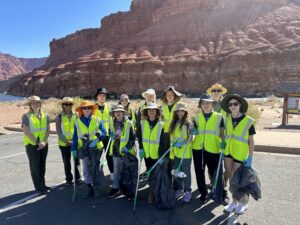 Kids Make a Difference
Kids Make a Difference
Learning the importance of giving back to one’s community as well as the satisfaction one feels for doing something for someone else is an integral part of our curriculum as it is in many other schools. We started the first Early Act Club, a community service club for elementary school students, in New England, sponsored by the Salem Rotary Club. When we began this relationship, we were one of 24 clubs in the world. What makes it different is that the students are the club: they are the ones that evaluate projects, organize them, and carry them out. They run the meetings, bring up ideas for a vote, and involve the whole school. They provide both service within the school (helping someone else, being a reading partner), local community (collecting items for a Joy Toy Drive. the NorthEast Animal Shelter, the Crombie St. Shelter for the Homeless, etc.), and the world (donating money to charities of their choice). Each experience makes a difference in different ways, but one of the most special aspects is making the decision together as a school for where to send their donation money. One year they heard about different needs in the community and world from local charities and area philanthropists, then voted on their choices. Another time the club’s officers evaluated charities and presented a proposal to the rest of the school for consideration. The ensuing discussion was memorable. Every dollar was carefully considered in terms of which would make the most difference, and their final decisions met everyone’s satisfaction, K-8.
Reflection Enhances Thinking
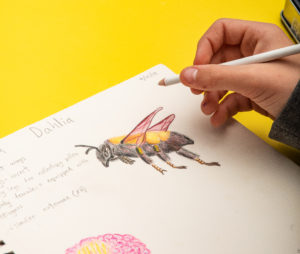 Part of being a good thinker is the ability to reflect on one’s thinking and learning. Metacognition is a $100 word that students at Phoenix love to use to describe the reflections they write or share with a teacher at the beginning, middle, and end of all important pieces of work. Reading or listening toThe students describe what they liked best about the work, or how they could make it more challenging, or how did their current discoveries connect with previous work, always including the word “because”.
Part of being a good thinker is the ability to reflect on one’s thinking and learning. Metacognition is a $100 word that students at Phoenix love to use to describe the reflections they write or share with a teacher at the beginning, middle, and end of all important pieces of work. Reading or listening toThe students describe what they liked best about the work, or how they could make it more challenging, or how did their current discoveries connect with previous work, always including the word “because”.
The World is our Campus – Learning in the context of the real world
In The Neighborhood
Community service has always been an important part of the Phoenix experience. The school’s presence in Salem’s downtown area and its flexible curriculum have positioned the Phoenix to respond to many opportunities in support of the local community. The Phoenix offers an annual Halloween party for young children during Haunted Happenings, joins with the Salem Rotary and Chamber of Commerce to host students from Japan and Ireland, and has worked with the Council on Aging, Help for Abused Women and Children (HAWC), Headstart and local food pantries.
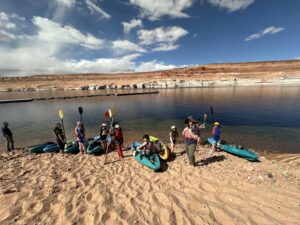 On the Bus
On the Bus
Each year the entire school heads off as a great big family for a four-day educational program that may incorporate a theme we have been studying all year or reflect the site we visit. It is a reward after a year of hard work, but it is also a unique opportunity to live and learn together. We have studied on the sand dunes of Cape Cod, in the woods of New Hampshire, in the tide pools of Maine, and on a working farm in Athol, Massachusetts. In recent years, we have gone to a summer camp in western Massachusetts to create a circus or a production to be performed on the Main Stage at Salem State College.
Around the World
In early spring, students in grades 5-8 embark on a travel study trip to a location of geological, historical, cultural and/or scientific significance. This week-long adventure has taken students to the Florida Everglades, Mammoth Cave, Carlsbad Caverns, Crow Canyon in Colorado, Georgia’s Okefenokee Swamp, St. John in the U.S. Virgin Islands, Tortola in the British West Indies, the Netherlands and even Italy!
Error: No feed found.
Please go to the Instagram Feed settings page to create a feed.

